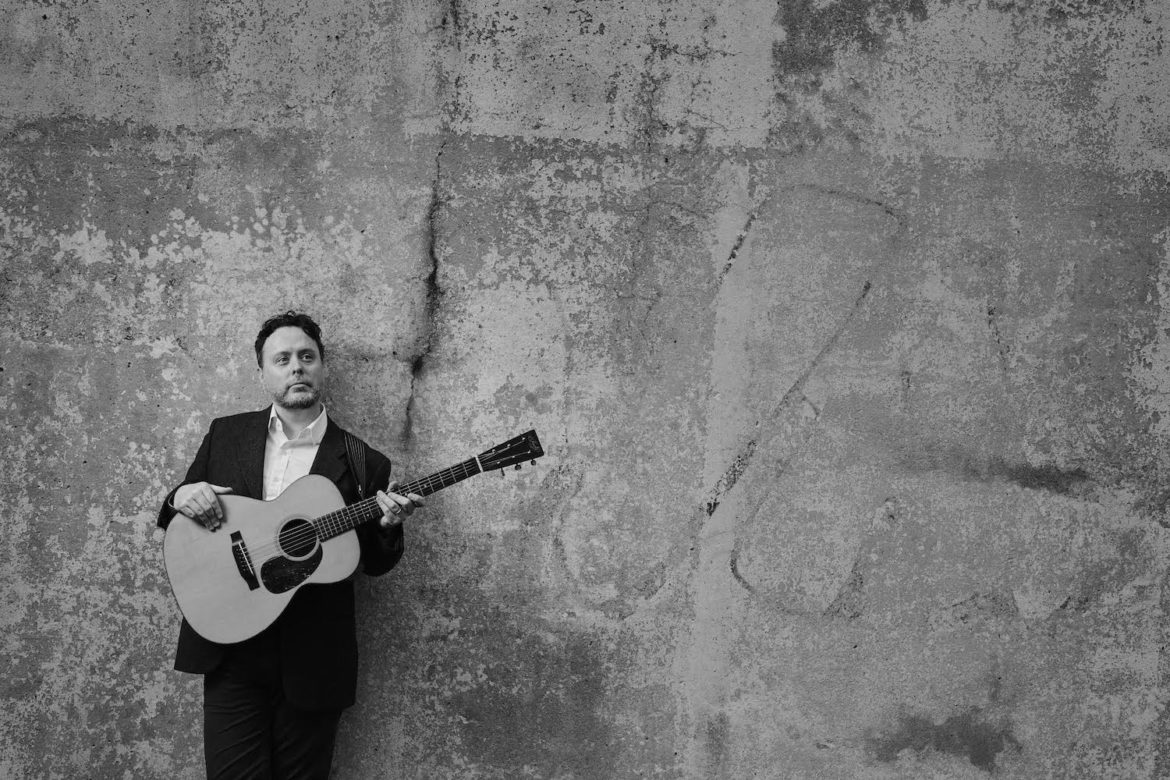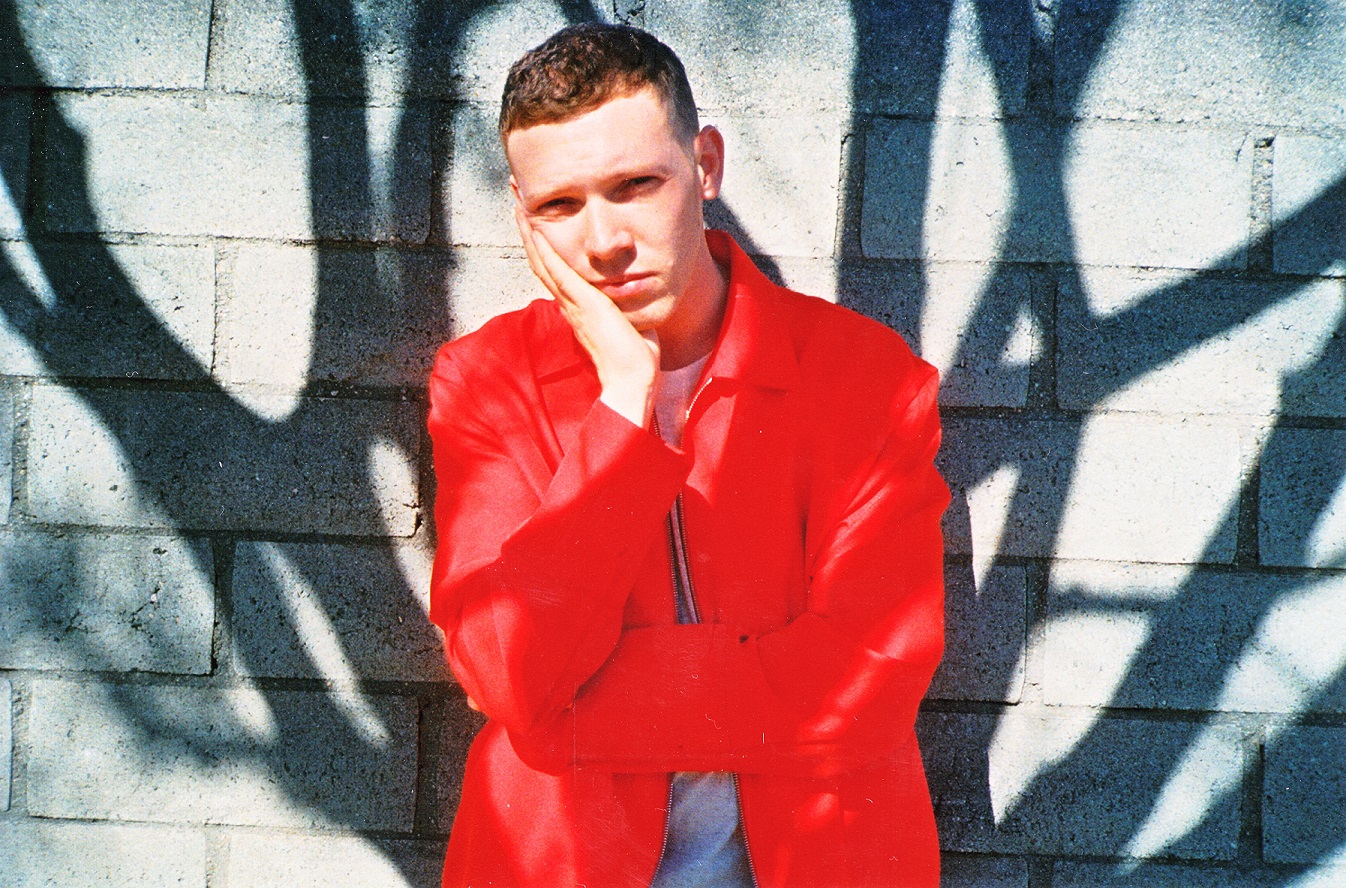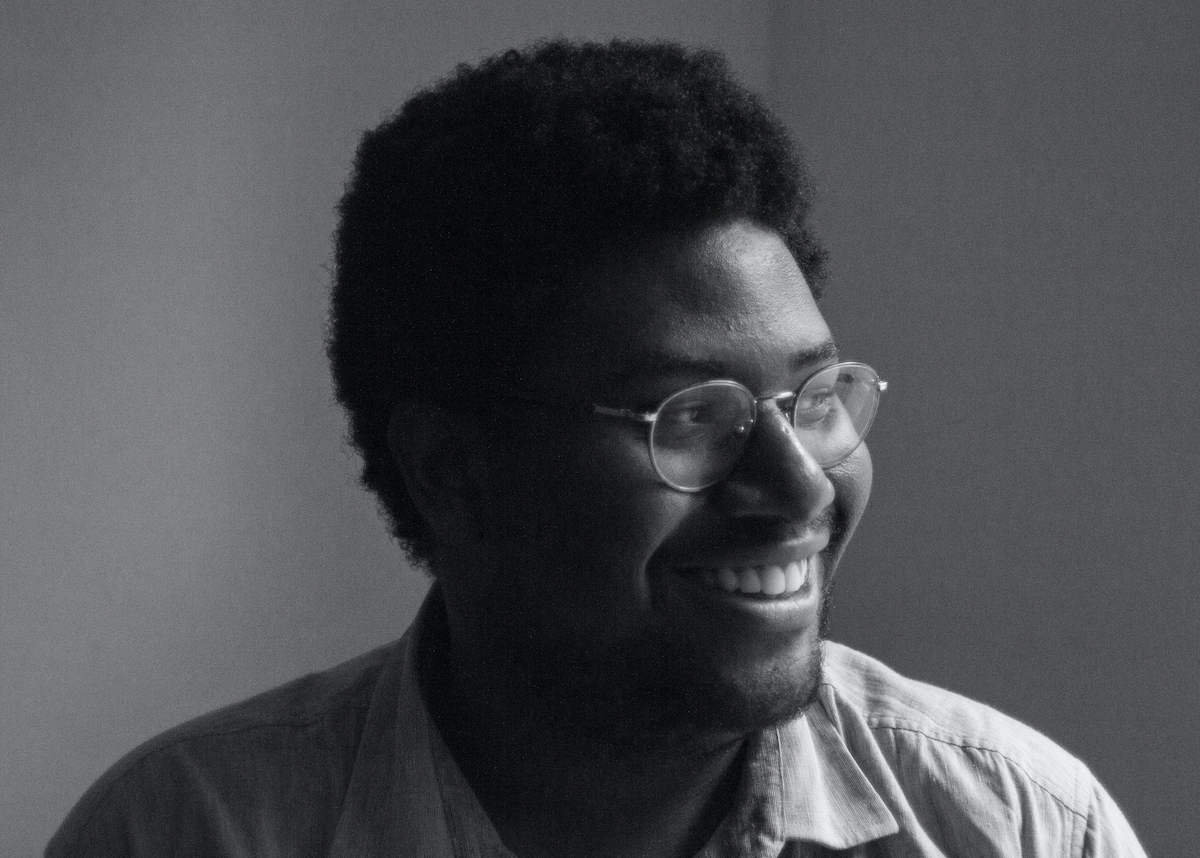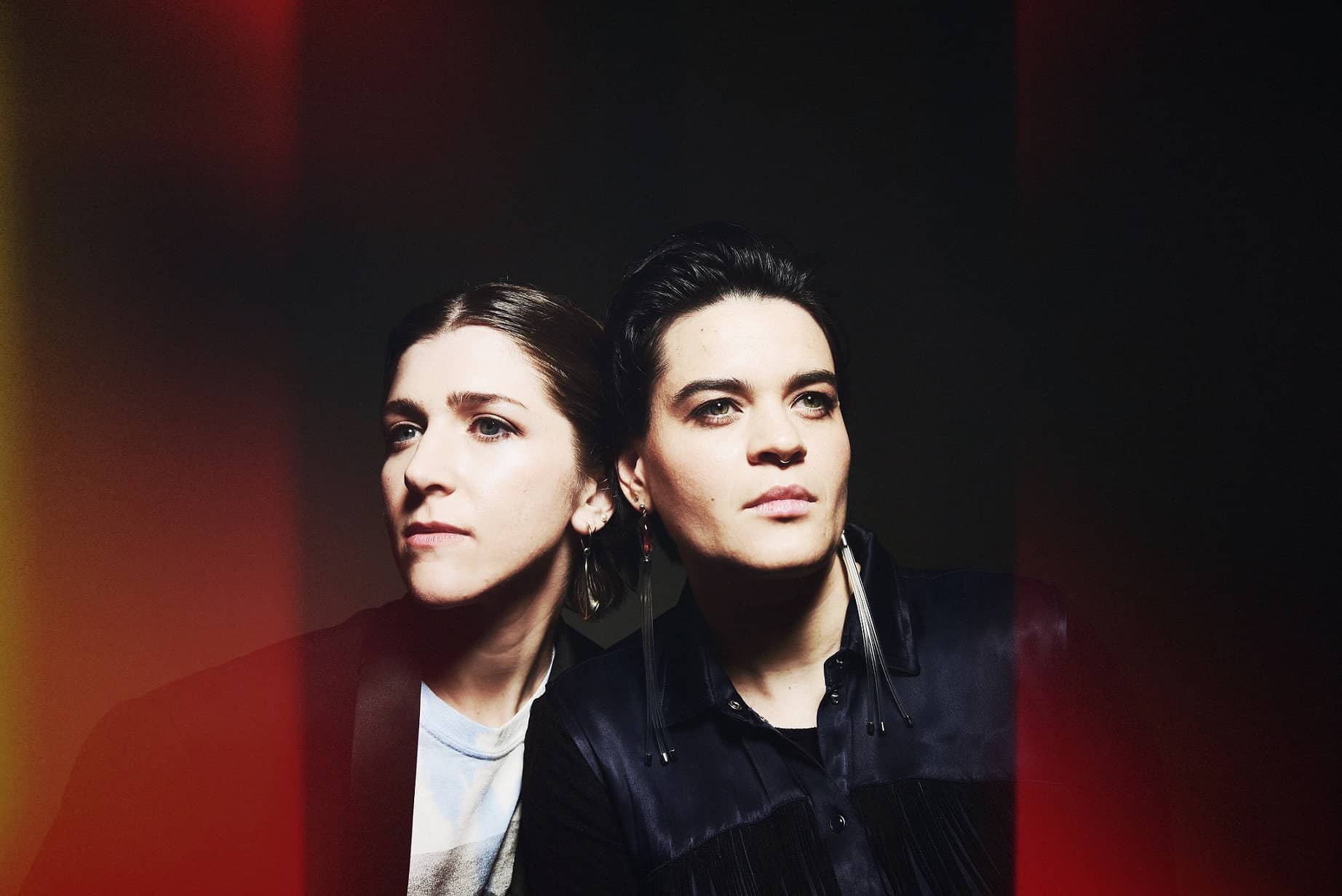With his new album ‘Peripheral Visions,’ guitarist Grant Gordy confirms that American String Music continues to evolve, offering unexpected and fresh dimensions in music.
by guest writer Mike Fiorito
Stream: “Bridge and Tunnel” – Grant Gordy
Guitarist Grant Gordy’s fifth album Peripheral Visions is due to be released on March 3, 2023.
And while Peripheral Visions emerges from Gordy’s extensive experience playing with the David Grisman Quintet and now Darol Anger’s lead group, Mr. Sun, this album reflects Gordy’s absorption of everything he’s learned and turning into something new.
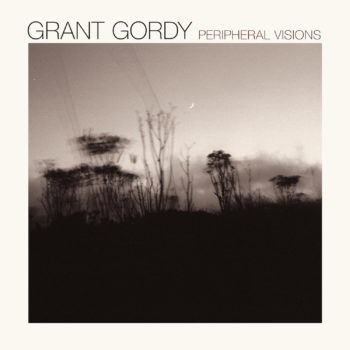
Even the title, Peripheral Visions, hints at the directions Gordy is searching for with his compositional style and playing. I’ve seen Gordy play a few times, with his group Mr. Sun and once with Ross Martin. Watching Gordy play, you can see that he’s always looking ahead and behind, even in the moment of playing. Not one to be content with riffing, speed playing or clever technique, there is something of a highly complex hire-wire act in Gordy’s approach to music. Watching Gordy play up close, I noticed that he never looks down at his guitar. He looks at the other players.
“How do you know where the frets are and what you’re going to do next?” I ask during a recent conversation.
“I’m not always sure,” he says.
Perhaps he hears out of the corner of his eye, with his peripheral vision.
But his playing always sounds precise, evocative, and incredibly inventive. His soul knows exactly what to do. It’s like he plays upside down and backwards simultaneously.
Peripheral Visions features Dominick Leslie (Hawktail, the Molly Tuttle Band) on mandolin and Alex Hargreaves (Sarah Jarosz, Billy Strings), on violin, along with Aidan O’Donnell, who plays bass in Mr. Sun. One thing that is especially evident in Peripheral Visions is that this is not a guitar album. Gordy gives room to all the players to step out. We hear the conversations between players. The overall effect is being on the inside of a group of musicians listening and playing to each other.
Peripheral Visions is an easy album to like. The music is no doubt complex and will be appealing to people interested in the deep study of composition and harmony, but will also be enjoyable to those who just like listening to good music. The songs are smooth and extremely melodic. While I can hear the many influences that have come together in Gordy’s playing, there is a distinct guitar style and overall sound that he’s developed.
Peripheral Visions confirms that American String Music continues to evolve, offering unexpected and fresh dimensions in music. Atwood Magazine recently spoke to Grant Gordy about Peripheral Visions. Listen to the album’s first single, “Bridge and Tunnel,” out now, and read more in our interview below!
— —
:: stream/purchase Grant Gordy here ::
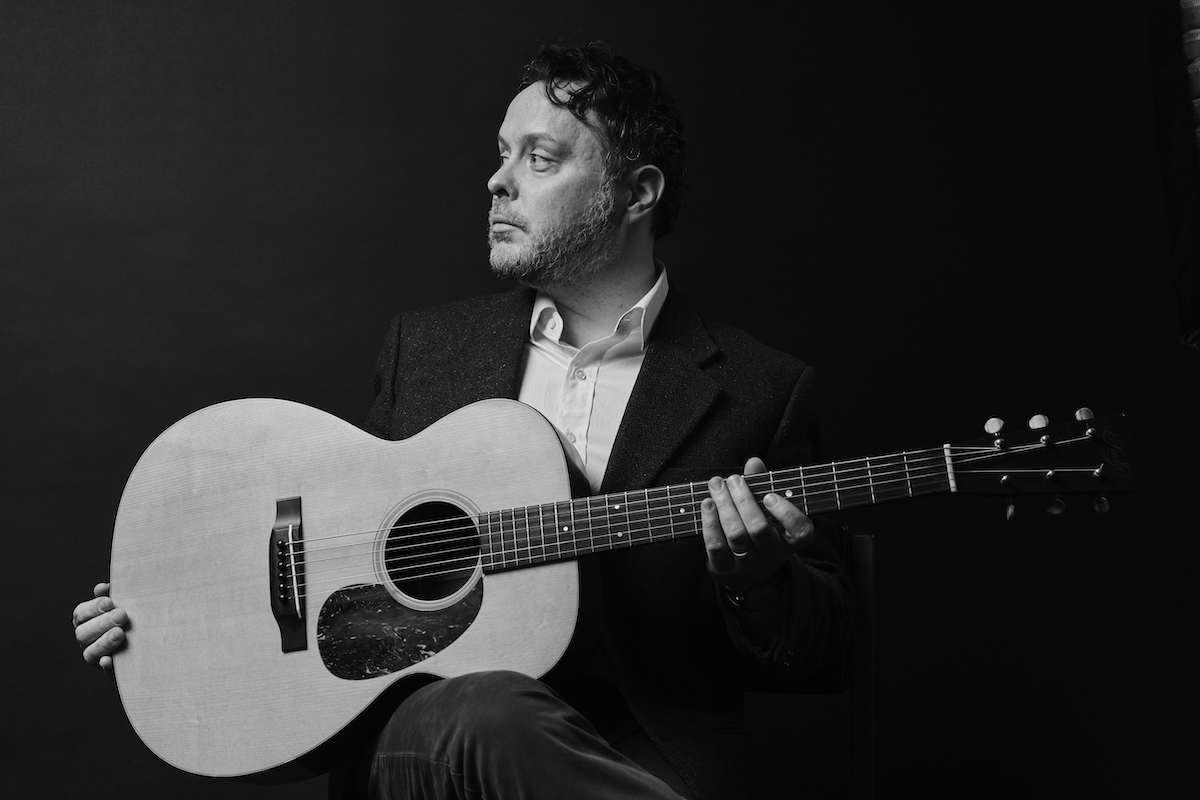
A CONVERSATION WTIH GRANT GORDY
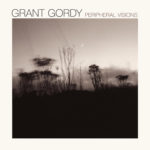
Why did you name the album Peripheral Visions? I’ve suggested that it reflects your intention to look outside of and beyond those styles that you’ve been reared in. Like jazz and bluegrass.
Grant Gordy: I think you’re onto something there, but I’ve never been a big fan of keeping things in stylistic or “genre” (a word I try to never use) boxes anyway. I keep an ongoing list of words, phrases and concepts that I like -more on this later- which I regularly consult for tune names. Titling instrumental music can sometimes be a challenge, unless a particular piece is directly inspired by a specific notion or experience. This sometimes happens, but often I write some music and then need to figure out what to call it. In this case, I go to the list. I had Peripheral Visions on there, and the more I thought about it, the more it seemed to fit this record, for a couple of reasons. Because I get to work with this particular ensemble only rarely (this band has existed in some form for about 15 years, but everybody’s busy; the last gig we played together was the Rockygrass festival in 2018), the very idea of “the Grant Gordy Quartet” has been on the back burner in favor of other projects for some time. The other aspect of peripherality is the way I sometimes feel like I’ve got a foot in a few different music scenes, but never feel completely absorbed in any one; I have periods of feeling a little on the sidelines in my work. Which is ok; I think many musicians feel that from time to time.
Why did you elect to work with this group of players?
Grant Gordy: I’ve been playing my original music with Dominick Leslie (mandolin) since he used to come over to my apartment in Denver, Colorado for rehearsals when he was still in high school. So we have a long history. Alex Hargreaves (violin) I met not long after that, and the three of us made my first record together back in 2010. I’ve been playing with Aidan O’Donnell here in NYC for years now, as well as out on the road with our band Mr. Sun, so we’ve put a lot of time into our musical relationship by this point too. I’d been wanting to revisit the GGQ idea in the studio, especially since so much time has now elapsed; we’ve all grown so much as players and people, and all done so many different things, but I still feel such an affinity with these particular musicians. Not just some of the brightest players on the scene today, but people I feel a strong and unique connection to. Something about going through the pandemic experience made me realize that I need to make an effort to get us back together.
What are you trying to say in your compositional style?
Grant Gordy: That’s a difficult question to answer directly. I guess I endeavor to reflect what’s meaningful to me, and hope that it resonates with others. Those meanings can be expressed in a harmonic structure, a tonality, an emotional sentiment; I want to play with all these elements because it excites and engages me. And I love improvisation, especially with such an open group of players. I like to play with the balance of structure and freedom, and I try to explore new possibilities of sound and texture in whatever ensemble I’m writing for. I probably have the most experience now working with the guitar/violin/mandolin/bass quartet format, so I take particular interest in experimenting with that sonic palette. Beyond technicalities, though, I just hope it makes people feel something.
Who would you say is your intended audience?
Grant Gordy: Anybody who will listen! I mean, there’s a small but interested group of people who follow what I do and I’ve often been asked when another GGQ record was in the pipeline. So for those folks, I sincerely hope it’s been worth the wait. Of course I’d like for new people to hear it, too. Whoever is open to these sounds, I hope they find this music.
Are there any musical influences on this album that you think would surprise us?
Grant Gordy: While I was doing a lot of the writing for this record, I was deeply enamored with Rainbow Sign, the last album by composer/trumpeter/cornetist Ron Miles, who tragically left this world in the winter of 2022, far too young. I’ve been a fan of his playing and writing for a long time but Rainbow Sign particularly made an impression. The compositions, the ensemble playing, the patience in the music, the catchiness, while at the same time being so deep- it holds up to endless listens. A true favorite and it really made a mark.
The album opens with “Bridge and Tunnel.” I love the staccato way it opens, and then moves into a kind of swing jazz feel. Why did you name it “Bridge and Tunnel”? That has a very specific New York City connotation.
Grant Gordy: “Bridge and Tunnel” is a good example of a title that was on my list, waiting for a home. The tune’s intense rhythmic feel and shifting harmony in the A section, which moves into something more spacious and tonal in the B section, all feel evocative to me of rumbling around underground on the trains, or navigating crowded streets, and then having those moments of sometimes unexpected calm and reflection, like when you get that cinematic view leaving Brooklyn on the Manhattan bridge.
I love the way “Espionage” comes slinking out of the speakers, like it’s walking sneakily up on us. I feel like this song especially reflects your sense of humor.
Grant Gordy: That was a tune where I realized, after starting to write it, that the title couldn’t be anything other than “Espionage.” I don’t remember how it came to me. Sometimes instrumental pieces end up with a title that never fits quite right, like a weird jacket that you want to like but you never feel totally comfortable in. But sometimes a title fits just right.
“The Alben Triangle” is named after private Bud H. Alben, an American soldier who lost his life during the campaigns of 1918 to commemorate all the sons of Brooklyn who fell during the battles of the Great War. I know it’s in Borough Park, Brooklyn. Is there something triangular about the song itself? Do I hear you quoting Thelonious Monk in this tune, or is that just me?
Grant Gordy: That’s a great question. I didn’t know much about Bud H. Alben per se. “The Alben Triangle” was on my list. I used to live in that part of Brooklyn, just a couple blocks from there, and I liked being in that area. The triangle is an odd shape- the grids intersect in a weird way there and the symmetry gets kind of thrown off; it feels somehow symbolic for that part of Brooklyn being a particular meeting point of cultures: a large Hasidic population abutting Brooklyn Chinatown and the Latino part of Sunset Park. Very New Yorky. The piece itself is something like a bebop tune, so you’re not incorrect in hearing a Monk influence!
“Elegy for Tony Rice” takes me on a journey. I don’t hear you playing Tony Rice licks. Perhaps that would be too head-on. Of course, we’re both Tony Rice fans, although you have a more direct connection to his lineage. What was the idea behind the song composition for this one?
Grant Gordy: That was a piece that I intended as a dedication to him as I began writing it. Tony Rice is a foundational figure for me, but probably more in his approach to ensemble playing than his solo licks. I only met him briefly a couple times, but his influence looms large, as it does for many musicians. I wanted to publicly pay him tribute. Not to try to copy his style, but just offer something to his spirit, wherever he is.
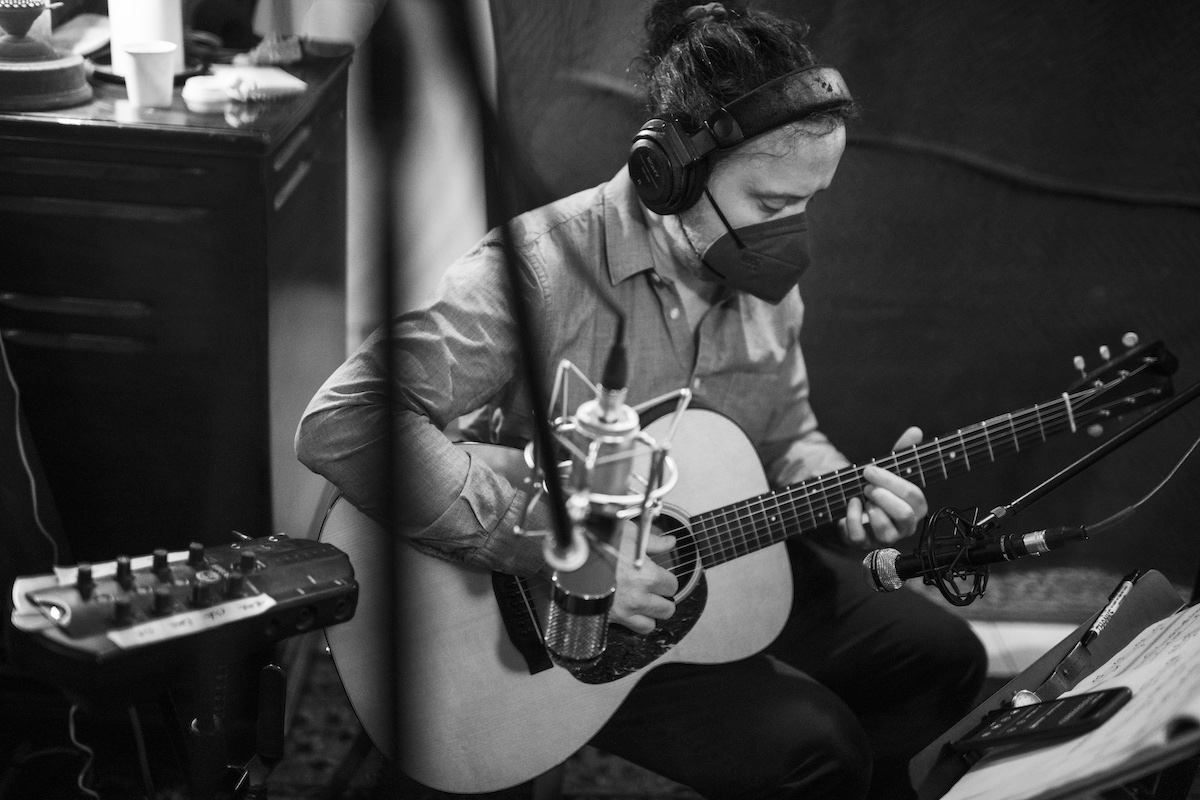
“Cloud of Witnesses” has a dissonant opening, then settles into a more melodic sounding song. It has a very modern classical feel to it. I love the way it ends, so soulfully. What can you tell us about this song?
Grant Gordy: This was one where there’s no solo-taking; the piece kind of speaks for itself and is more or less through-composed. As we were rehearsing for the session, we had the idea of opening the piece by just playing free. What is on the record is all one take with no edits. I really like the contrast of the “unsettledness” of the free section developing into what I feel is the most contemplative-sounding piece on the record.
The song “Mobius” is delicate and yet very intricate. It swings but only gently. The melody orbits around a very bare structure, making it singable. What was the inspiration behind this tune?
Grant Gordy: I intended “Mobius” to be a tune where you couldn’t really tell where the melody begins or ends, how long the form is (though it is a standard 32-bar form) or even what time signature it’s in, though it does have a specific melody and chord changes. The goal was for it to be pretty, yet opaque. We thought a bit about Wayne Shorter’s piece “Nefertiti” before recording the take that ended up on the album.
“To Ron” is a lovely song. Unlike most of the songs on the album, it doesn’t have that Gordy humor touch to it. It’s earnest and moving.
Grant Gordy: “To Ron” is a direct statement of appreciation for the aforementioned Ron Miles and his music. Just gratitude.
Knowing your sense of humor, I looked up “International Klein Blues” and saw that you named it after International Klein Blue, a deep blue hue first mixed by the French artist Yves Klein. I think the curtains in our apartment are blue ultramarine. It’s a funky tune. Is there any context behind the title?
Grant Gordy: I’m so glad you caught that! That title was definitely on the list. I heard about it in this great book of essays by Rebecca Solnit called “A Field Guide to Getting Lost,” in which she writes these beautiful contemplations on travel, art, music, and relationships. That notion of “International Klein Blue” really struck me. It was just too good not to turn into a “Blues,” though it’s not actually a blues form. But neither is “Basin Street Blues” or “Limehouse Blues,” so there you go.
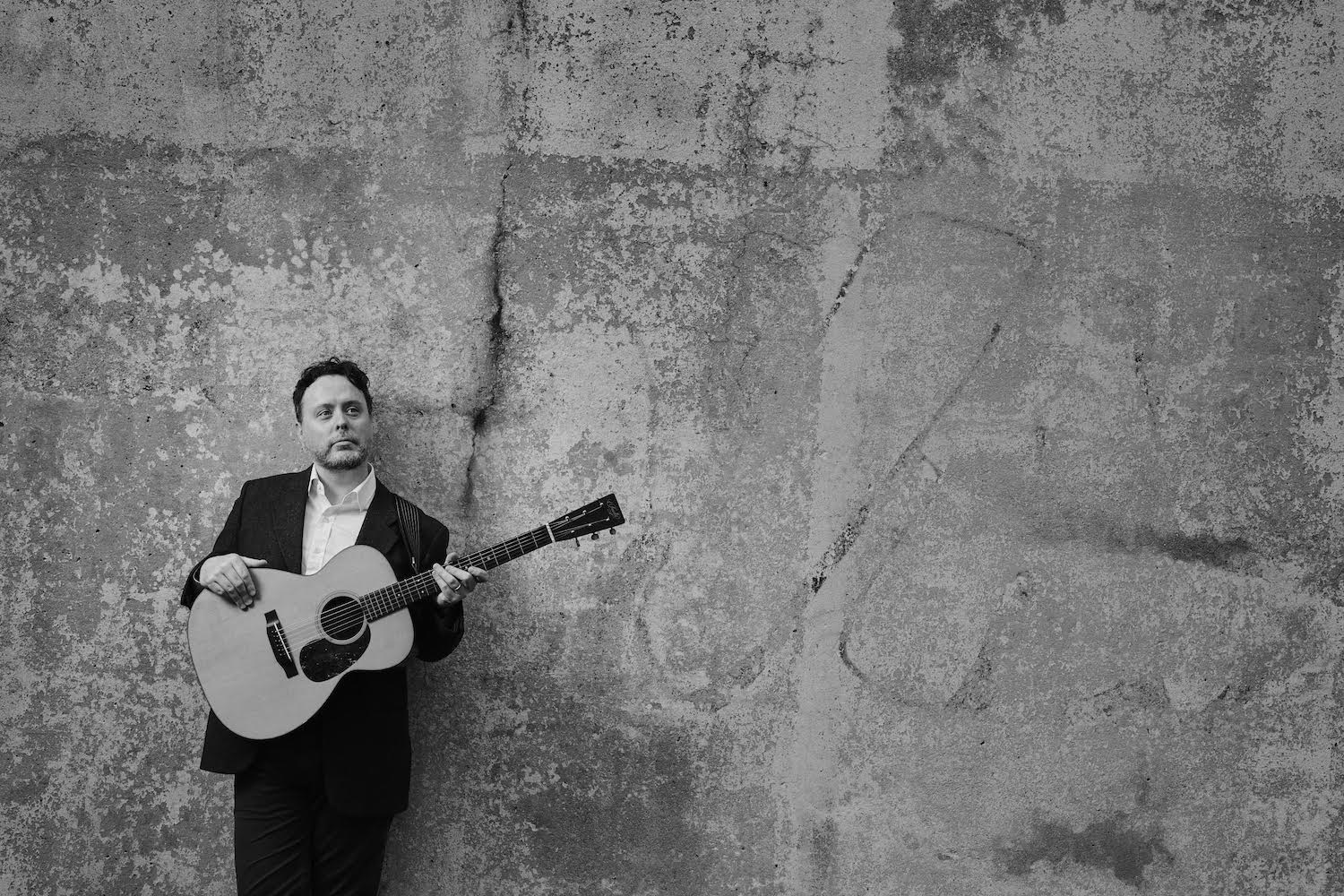
“Journey to Miniera” is a sweet tune. Very evocative. Miniera means 'mine' in Italian. Did you write this on your visit to Sicily?
Grant Gordy: I didn’t write it in Italy, but it’s dedicated to a community of friends I have made in previous visits in years past. For years now, a wonderful and dedicated group of people have been putting on a music camp outside of the city of Urbino called “Minieracustica,” and I’ve been hired a couple times to come over and teach there. It’s truly one of my favorite places in the world. Everyone stays on top of this mountain where there’s an old sulfur mine that’s been renovated into an arts retreat. They hang and study music for a week and have the best food and it’s just the greatest time; summer in Italy with lovely people in an idyllic mountaintop paradise. What more could you want? I have established some deep friendships because of Minieracustica and I can’t wait to go back.
”Do
— —
:: stream/purchase Grant Gordy here ::
— —
Mike Fiorito Mike Fiorito is an author and a freelance music reviewer. His book Falling from Trees won the 2022 Independent Press Distinguished Book Award. Mike’s latest book, Mescalito Riding His White Horse, Inspired by the Music of Peter Rowan, is currently available for pre-order and will be published in April 2023. For more information, please go to mikefiorito.com.
— —
Stream: “Bridge and Tunnel” – Grant Gordy
— — — —

Connect to Grant Gordy on
Facebook, Twitter, Instagram
Discover new music on Atwood Magazine
? © Jacob Blickenstaff
:: Stream Grant Gordy ::

